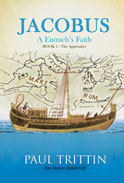
 |
Born at the beginning of the first century, Jacobus lives a life that is both comforting and cold. An identical twin, he and his brother Josephus came into the world in 14 A.D., sons of a powerful maritime trader. Their mother, however, died shortly after birthing them. Shunned by their older siblings and largely ignored by their father after this tragedy, Jacobus and Josephus bond as twins often do, forming their own activities and even their own language. The twins take things a step farther, fostering a romance between the two of them that draws their father’s anger. Continuing their exploration in secret, they are confined to their house, having tutors brought in to prepare them for the outside world.
When Jacobus and Josephus are near their coming of age, their father decides to split them up, having the mathematically-inclined Josephus learn how to run the warehouses and the linguistic Jacobus go to sea, learning the trading business firsthand. While Jacobus is distraught at being separated from his brother, he can’t help but be a little excited at the prospect of seeing the world. As Jacobus spends his first year at sea, he discovers his own capacity for unconditional love, an extended family that he never expected to find, and a curiosity for the message of a new prophet who many people claim to be the son of God Himself. Feeling like an outcast from an early age, Jacobus’s adventures help him to create a place for himself in the world and open his heart up to both compassion and unexpected romance.
Blending a touch of history with a unique and fresh cast of characters and perspectives, this book tells a common story in today’s world of feeling like an outcast, framed in the social attitudes of two millennia past. Jacobus’s status as an “uncut eunuch” causes him social concern; he conceals that critical part of his identity publicly while filling his heart with it in private. With each person that Jacobus bonds with, he increasingly learns not to be ashamed of who he is, despite growing up with that as a concern. As Jacobus feels his way out of that shame, he discovers several machinations his family enacted in order for him to experience love in the place of humiliation. These messages are important for readers now, but they carry extra weight coming from a character who lived long before equal rights laws or social justice.
The additional component to this story that strengthens that message of pride and acceptance is the religious aspect that picks up in the latter half of the book. Fostering the idea that a Christian-based faith and homosexuality are not necessarily exclusive identifiers, the story shows Jacobus and his Jewish family being increasingly moved by the rhetoric that comes from the mysterious Jesus and his disciples. Instead of being chastised or cast out by both new characters and biblical figures who were active at this point, Jacobus, his family, and lovers are welcomed in and embraced.
In this first book in a series about Jacobus’s life, the core messages of tolerance and loving those either different or less fortunate than oneself resonate strongly in modern society's confrontational environment. Empowering to readers who might identify with Jacobus’s sexual orientation and heartening to those who simply feel compassion and acceptance for anyone who identifies as homosexual, this story carries a lot of heart while entertaining with its unique historical perspective.